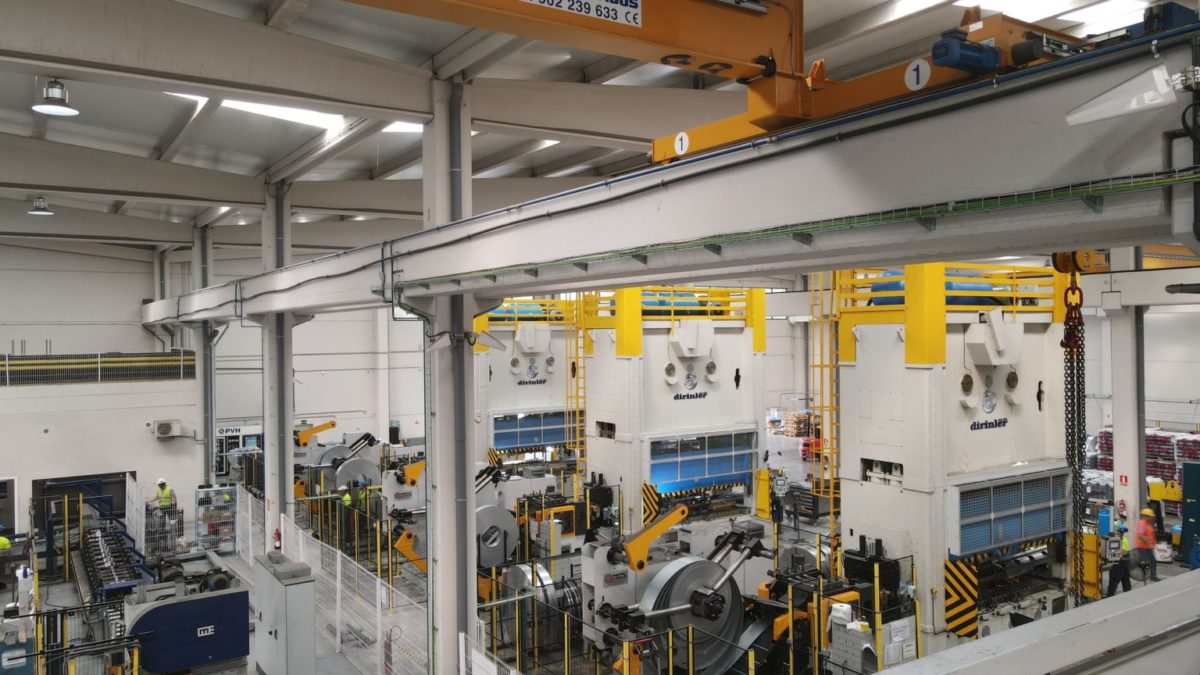From pv magazine USA
PV Hardware (PVH) ranks among the largest solar tracker providers in the world, with nearly 10% of global market share. The company has manufacturing facilities in Spain and Saudi Arabia, and has been a market leader in European and Middle East markets since 2018. Now, it is set to make a splash in the US market, as it has announced plans to build a facility to manufacture its products in Texas.
The company said it expects the 6 GW factory to be operational by June 2023. It said most companies sign sourcing agreements with a wide set of providers, but it operates differently. The company said it controls every aspect of its product, from buying its own steel, sourcing electronics to building its own controllers, making its own rivets, owning its robotics, and paying for in-house PVH labor. The site will be the company’s third wholly owned factory in the world.
“The solar industry is one of the most challenging in terms of execution times. We are building bigger plants than ever in a shorter period of time, it is an impossible task if it’s not well supported by suppliers,” aid Hitesh Patel, head of solar PV for KSA. “Thanks to PVH, we are able to received the material in the shortest time imaginable and start construction on schedule despite challenging market dynamics and supply chain disruptions. A dedicated manufacturing line is essential for short and timely deliveries.”
Popular content
PVH has operated in the United States since it was established in California in 2011. The company has supplied more than 2.5 GW at 36 solar projects across the country. Its new factory is the latest in a wave of clean-tech manufacturing developments since the passage of the US Inflation Reduction Act (IRA). The IRA incentives include:
- An investment of $30 billion in production tax credits to accelerate domestic manufacturing of solar panels, wind turbines, batteries, and critical minerals processing
- A $10 billion investment tax credit to build clean technology manufacturing facilities, including those that make electric vehicles, wind turbines and solar panels
- $500 million in the Defense Production Act for heat pumps and critical minerals processing
- $2 billion in grants to retool existing auto manufacturing facilities to manufacture clean vehicles
- Up to $20 billion in loans to build new clean vehicle manufacturing facilities across the United States
- $2 billion for National Labs to accelerate breakthrough energy research
Across the solar supply chain, the IRA includes the following credits:
- Manufacturing credit – 100% credit through 2029, 75% in 2030, 50% in 2031, 25% in 2032
- Thin-film photovoltaic cell and crystalline photovoltaic cell: $.04 per cell capacity in Wdc
- Photovoltaic wafer: $12/sq. meter
- Solar grade polysilicon: $3/kg
- Polymeric backsheet: $0.04 persquare meter
- Solar module: $0.07 per module capacity in Wdc
- Torque tube: $0.87/kg
- Structural fastener: $2.28/kg
- Central inverter: $0.025 per capacity Wac
- Commercial inverter: $0.015 per capacity Wac
- Residential inverter: $0.06 per capacity Wac
- Microinverter: $0.11 per capacity on Wac
- Battery module: $10 per battery module capacity kWh
- Critical mineral: 10% of costs incurred
- Battery cell: $35 per battery cell capacity kWh
“With long-term incentives for clean energy deployment and manufacturing, the solar and storage industry is ready to create hundreds of thousands of new jobs and get to work building out the next era of American energy leadership,” said Abigail Ross Hopper, the president of the Solar Energy Industries Association.
This content is protected by copyright and may not be reused. If you want to cooperate with us and would like to reuse some of our content, please contact: editors@pv-magazine.com.



By submitting this form you agree to pv magazine using your data for the purposes of publishing your comment.
Your personal data will only be disclosed or otherwise transmitted to third parties for the purposes of spam filtering or if this is necessary for technical maintenance of the website. Any other transfer to third parties will not take place unless this is justified on the basis of applicable data protection regulations or if pv magazine is legally obliged to do so.
You may revoke this consent at any time with effect for the future, in which case your personal data will be deleted immediately. Otherwise, your data will be deleted if pv magazine has processed your request or the purpose of data storage is fulfilled.
Further information on data privacy can be found in our Data Protection Policy.